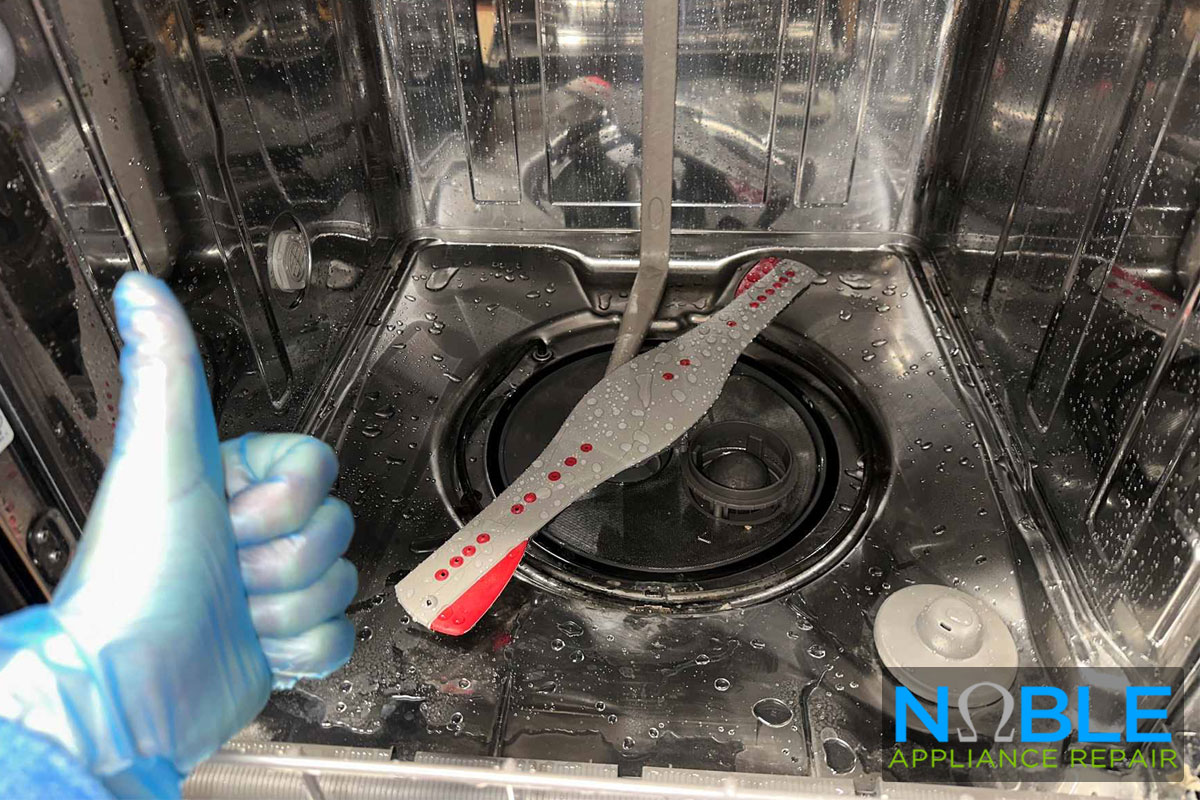Home | Blog | Should You Repair or Replace Your Dishwasher?
Should You Repair or Replace Your Dishwasher?
When your dishwasher stops working, deciding whether to repair or replace your dishwasher becomes an urgent household dilemma. That odd noise, leaking water, or even complete failure forces homeowners to make decisions about their broken dishwasher quickly. But most people struggle with this choice because they lack clear information about what makes financial sense for their situation.
However, you don’t need significant technical expertise to find the most cost-effective solution for your kitchen. You just need to know several practical things before making your decision: the exact nature of the problem, the estimated repair costs, and the replacement price. In this article, we’ll examine how to combine these factors and, by applying several practical rules, make a smart decision about your broken dishwasher, saving time and money.

Common Dishwasher Problems
But let’s begin with understanding what can go wrong with a dishwasher. The list of common potential issues ranges from simple fixes to complex overhauls requiring professional dishwasher repair in Atlanta. That’s why the diagnostics stage is important. Recognizing specific symptoms is the very first step towards determining whether you should repair or replace the dishwasher. Making diagnostics properly can potentially save you hundreds of dollars.
Here’s the list of common dishwasher problems with typical symptoms:
Clogged Spray Arm
Dishes coming out dirty with stuck food particles indicate a clogged spray arm. This relatively minor issue prevents proper water circulation during wash cycles. You might notice certain areas of dishes consistently dirty or food particles trapped in the same spots after washing cycles.
Dishwasher Noise
Unusual grinding or rattling from the motor assembly signals worn bearings or objects caught in the mechanism. These disturbing sounds often worsen during specific cycle phases and may indicate advancing mechanical failure. Buzzing, clicking, or grinding noises during operation require prompt professional attention.
Control Board Failures
A malfunctioning dishwasher with cycles that start and stop randomly or unresponsive buttons points to electrical problems in the control board. This serious issue prevents normal operation and requires repair technicians for accurate diagnosis. You may notice the digital display showing error codes or buttons not responding to touch in such a case.
Door Latch Issues
A dishwasher door that won’t close properly or stay locked during cycles suggests damaged door latch components. This safety feature prevents operation when compromised and can lead to leaks and incomplete cycles. You’ll notice the machine won’t start or stop mid-cycle if you have a problem with the door.
Heating Element Failure
Dishes remaining wet after the dry cycle often indicate heating element problems. This moderate dishwasher issue affects both drying performance and sanitization. You might notice dishes come out wet and cold at the end of cycles, or do not steam during operations.
Pump and Motor Failures
Unusual vibrations or failure to drain water points to pump or motor problems. These serious dishwasher issues typically result from extended use or poor build quality. Symptoms include standing water, grinding noises, and incomplete cycles that stop unexpectedly.
Seal and Gasket Deterioration
Water leaking around the door indicates worn door seals or damaged gaskets. This common problem relates directly to the dishwasher’s build quality and age. You’ll notice water pooling around the base of the unit or moisture on the floor after cycles complete.
Is It Worth Repairing a Dishwasher?
In our comprehensive guide “Replace or Repair Your Appliances,” we established that the decision to repair or replace appliances follows a simple rule: fix when repair costs are under 50% of replacement costs. Now let’s apply this principle specifically to a dishwasher and determine if it’s worth fixing a dishwasher in your particular situation.
Step 1: Identify the Specific Problem
Determine exactly what’s wrong with your dishwasher. Request professional service if needed. Some problems indicate declining overall condition, while others are isolated issues with simple fixes (we will return to this point a bit later).
Step 2: Get an Accurate Repair Cost Estimate
Contact qualified appliance repair technicians for a professional diagnosis. Most companies charge a service fee ($50-150) for the initial visit, which may be applied toward the appliance repair costs if you proceed with their service. Get multiple quotes if possible, as prices can vary significantly between providers.
Step 3: Apply the 50% Rule
Compare the total dishwasher repair cost to a new dishwasher’s price. If repairs exceed 50% of replacement cost, buying new often makes more sense financially. For example, spending $450 to repair a dishwasher that cost $700 new doesn’t pass this test, and replacement would be the better option.
Step 4: Also Consider Your Dishwasher’s Age
Most dishwashers last 7–12 years with proper maintenance. If yours is approaching or exceeding this age range, even relatively affordable repairs may not be economical since other components will likely fail soon. A 10-year-old dishwasher with multiple small issues signals approaching end-of-life.
Step 5: Check Warranty Coverage
Verify if your dishwasher remains under the manufacturer’s warranty or extended service plan. Covered repairs typically incur no cost beyond a possible service call fee. Some manufacturers offer surprisingly long warranties on specific components like motors or electronic systems.
Step 6: Research Parts Availability
Older models often have limited parts availability, which affects both current and future repair options. Ask your technician about parts sourcing for your specific model—if parts are scarce, prices increase substantially, and repairs may take weeks instead of days.
Step 7: Evaluate the Frequency of Repairs
Multiple frequent repairs indicate declining reliability and increasing maintenance costs. If your dishwasher’s age and repair history show it needed fixing twice or more in recent months, replacement likely makes more sense than continued investment in a deteriorating appliance.
Step 8: Consider Energy Efficiency Gains
Newer dishwashers use 30–50% less electricity and water compared to models manufactured before 2013. When weighing all these factors, improved energy efficiency might offset higher replacement costs through reduced utility bills over time, making a new purchase the smarter long-term choice.
DIY vs. Professional Repair
When to DIY:
- Clogged spray arms or filters need simple cleaning without replacement parts.
- Door latch adjustments require basic tools and minimal technical knowledge.
- Simple drainage issues often involve the simple removal of debris from accessible areas.
- A control board panel reset can solve minor electronic glitches without professional help.
When to call professionals:
- When DIY repair attempts have failed or made the problem worse.
- If your dishwasher is still under warranty and needs repair, attempting DIY fixes voids most warranties, so consider calling professionals.
- Motor assembly problems require specialized tools and expertise for proper diagnosis.
- Most control board failures require technical knowledge.
- Water inlet valve repairs involve working with electrical and plumbing systems.
- Persistent leaks might indicate several factors contributing to serious system damage, but in most cases, it’s better to call professionals.
- When multiple systems are failing simultaneously, it suggests deeper issues worth evaluating professionally.
Is It Cheaper to Repair or Replace a Dishwasher?
Repairing a dishwasher is typically less expensive than replacing it for minor to moderate issues. The practical 50% rule applies: if repair costs exceed half the price of a new model, replacement makes more sense. Consider several factors beyond just immediate expense: the age of your dishwasher, whether replacement parts are still available, and energy efficiency gains from newer units. For older dishwashers with multiple problems, a new model often provides better long-term value despite the higher initial purchase price.
How Much Will It Cost to Fix My Dishwasher?
Dishwasher repair costs typically range from $150 to $300, with most homeowners paying around $200 according to current pricing data. Specific problems determine the final cost: minor issues like clogged spray arms might cost just $75-100, while major problems with the control board can reach $200-600. The service call fee in Atlanta averages $55-100, which many companies apply toward the total costs of repair. Again, when deciding between dishwasher repair and replacement, consider the 50% rule – if repairs exceed half the price of a new unit, replacement is usually more economical.
How Long Will My Dishwasher Last?
According to Consumer Reports, most dishwashers should last about 10 years, which aligns with manufacturer expectations. However, their survey data reveals that approximately 23% of dishwashers experience problems within just five years of ownership. To maximize your dishwasher’s lifespan and continue to effectively wash dishes, proper maintenance is essential – including regular filter cleaning and avoiding overloading.
How Much Does a New Dishwasher Cost?
The cost of a new dishwasher typically ranges from $400 to $1,200 for a standard 24-inch built-in model, with price depending on features and brand. Entry-level new machines with basic features like plastic tubs and standard washing cycles cost $400-$800, while mid-range models with stainless steel interiors and smart features run $800-$1,200. High-end dishwashers with premium features can cost up to $3,000.
Having Trouble With Appliances? Call Noble BHS!
Not sure whether to replace or repair your dishwasher? Contact Noble BHS at (676) 646-4346 or through our website for expert assessment that will help you to find the best option for your kitchen!
Our experienced technicians will evaluate your dishwasher’s age, repair history, and current condition, helping you make the most cost-effective decision. From leaking doors to malfunctioning control boards, our specialists diagnose and fix nearly any dishwasher problem using quality replacement parts and professional techniques. We provide honest recommendations based on your specific circumstances and budget priorities, ensuring you get the smartest solution for your kitchen appliance needs.
You may also be interested in
- Replace or Repair Your Appliances: A Complete Guide to Making the Right Choice
- Why Your Refrigerator Is Making Strange Noises – Causes & Fixes
- How Much Does Appliance Repair Cost in Atlanta: 2025 Guide
- Should You Repair or Replace Refrigerator When it Breaks Down?
- Why Your Fridge Is Making Loud Noise and How to Fix It
- Repair or Replace Washing Machine: Making the Right Choice




